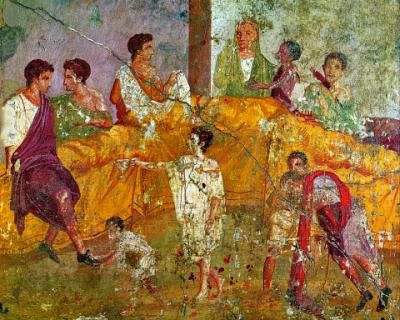http://www.bbc.co.uk/news/world-europe-11952322
These findings on analysis carried out upon 50 skeletons found in a pomegranate store at Pompeii, are very interesting. However like many archaeological studies I read, I often feel that their reporting can sometimes draw conclusions which might not be entirely correct to make on the basis of the evidence and these conclusions are frequently not corrected by those carrying out the research. This particular report is done by a Professor Mary Beard University of Cambridge for the BBC website. and the title is misleading, as it goes on to describe the age and health of the Romans found revealing nothing of their possible family life!
In this case it is found that many of these remains were of people generally older than we often think the population would have been but it goes on to say that this disproves conventional theories about the age of the average Roman citizen. But surely if they were sheltering in a store rather than running away or fighting through crowds of panicking populous you would expect that they would have been older people and children and therefore not an accurate sample of the population generally. It also states that they were a lot taller than we think Romans were and therefore Romans must have been generally taller than we think, in fact taller than present day Neapolitans. But in a population with a high proportion of slaves, who's to say that they were Romans at all but foreign slaves. Certainly in a disaster such as this they would have been obligated to stay close to their masters for fear of punishment and if a rich middle aged merchants wife had 7 or 8 attendants surely this would distort the claims of the analysis that Romans were a lot taller if you simply looked at this sample. Maybe the majority of the skeletons were of slaves who worked in the store who knows? I really don't think a find of 50 skeletons in a single place one can draw any firm conclusions. It is my opinion that there is often not the rigorous sample testing and analysis carried out upon archaeological finds than would be expected with other scientific research prior to reports of these investigations being made available to the media. Which can often lead those outside the profession or even within it at times, to draw conclusions which in many cases have no bearing on the level of evidence found. Is this a method of justifying future research grant applications I wonder, given that archaeological research is always given quite a low priority compared to other sciences? I don't know!
The most sensational revelation! of this report is that evidence has been found to prove that the pathogen syphilis was around at the time of Pompeii by the indentations found on the teeth of some of the child remains found. For those that are unaware, it has always been assumed that the venereal form of syphilis was brought to Europe from the Americas as a consequence of Christopher Columbus's voyage to the New World. The disease has for centuries had a devastating effect upon Europe's population with the first recorded epidemic of the disease being in 1495. The venereal disease we commonly identify as Syphilis, it seems, developed in the New World from the tropical disease of Yaws perhaps 1,600 years ago and spread throughout that continent.There exists very little evidence that it existed in Europe prior the the 15th Century. Although over many years there have been a number of finds at half a dozen sites in England, and Europe in which the skeletons have malformations consistent with the pathogen, such as thickening in the lower leg bones and pitting in the skull. It is therefore a subject which deserves a great deal more research and cannot be proved or disproved simply by one archaeological find at Pompeii unless the medical evidence is irrefutable.
http://www.pbs.org/wnet/secrets/prev...lis/index.html
http://www.archaeology.org/9701/news.../syphilis.html
"The skeletons of a pair of twins show what were almost certainly the signs of congenital syphilis. If that is correct, then it puts paid to the usual idea that the disease was brought back to Europe from the New World by Christopher Columbus and his sailors in the 15th Century.
I am sorry but this statement needs a great deal more explanation. The terms "almost certainly" and "if this is correct" should not form part the same sentence in piece of scientific research and if it does not form part of a piece of scientific research then it should not been given credibility by reporting as if it had been proved. Regrettably archaeology is not an exact science and quite often prone to exaggerated and insufficiently proven claims unless archaeologists are more cautious in their research and reporting of findings.
Apparently there is a programme to be broadcast "Pompeii: Life and Death in a Roman Town" on BBC Two at 2100 GMT on Tuesday 14 December, or afterwards on BBC iPlayer. This should hopefully reveal more detail about this research.







 Reply With Quote
Reply With Quote







